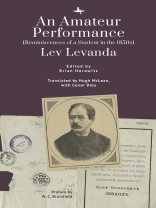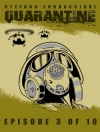Translated for the first time in English, Lev Levanda’s brilliant coming-of-age story of Russian Jewish students on the cusp of modernity in their struggle against religious chauvinism and an oppressive government.
Despite being Russia’s best Jewish writer of the nineteenth century, Lev Levanda (1835–1888) is barely known in the English-speaking world, with some of his most famous works, like the 1873 novel Seething Times, having yet to be published in their entirety. Another such work is An Amateur Performance (Reminiscences of a Student in the 1850s), which appears here in English for the first time, translated with elegance by Hugh Mc Lean and edited by Brian Horowitz and Conor Daly. A classic in Russian-Jewish literature from 1882, An Amateur Performance describes the rush by Jews to government schools, secular education, and the lights of enlightenment, while also revealing the struggles of these Jewish students on the cusp of modernity, including keen observations on their lack of preparation, their confusion over the new ideas, and their confrontation with the repressive power of the Russian government. In short, it’s a brilliant sociological study of Russian Jewry in the 1850s as remembered by a writer who fought for progress and Jewish integration.
Spis treści
Acknowledgements
Preface, by Professor William Craft Brumfield
Introduction
1. An Amateur Performance (Reminiscences of a Student in the 1850s)2. On Hugh and a Berkeley Ph D: Recollections of Hugh Mc Lean, Translator and Professor of Slavic Studies, by Brian Horowitz
Photographs
1. Lev Levanda in his youth. From the New York Public Library Collections.
2. Lev Levanda in middle age. From the New York Public Library Collections.
3. Invitation to the funeral service for Lev Levanda. From the New York Public Library Collections.
4. Brian Horowitz. Photograph courtesy of Brian Horowitz.
5. Hugh Mc Lean. Photography courtesy of the Slavic Department at UC Berkeley.
6. William Brumfield at Dwinelle Plaza, June 1966. In background: Wheeler Hall and Campanile. Photograph courtesy of William Brumfield Collections.
7. Sproul Plaza meeting, fall 1967. In background: Sproul Hall. Photograph: William Brumfield. Courtesy of William Brumfield Collections.
O autorze
Lev Levanda was born in Minsk. He studied in a local Jewish school and a rabbinical school in Vilna, after which he took a teaching job in Minsk, where he also assisted with editing state textbooks for Jewish children. He began to write articles and fiction in the early 1860s for various Jewish publications in Odessa, St. Petersburg, and Vilna. While he was an assimilationist rather than traditionalist at the beginning of his career, he later became a proponent of Jewish self-defense during pogroms, critic of extreme assimilation, and spokesperson for early Zionism. Levanda’s best known work is the novel Seething Times (1873), which depicts the Jewish response to the Polish uprising of 1863.
Brian Horowitz attended New York University and University of California, Berkeley where he studied Slavic Languages. He holds the Sizeler Family Chair and is professor of Jewish Studies at Tulane University. A recipient of many major awards including Yad Hanadiv, Lady Davis, Alexander Von Humboldt, and Fulbright, he is the author of six books including Vladimir Jabotinsky’s Russian Years (2020); Russian Idea-Jewish Presence (2013); Empire Jews (2009); and Jewish Philanthropy and Enlightenment in Late-Tsarist Russia (2009). His present research is focused on the radical right-wing Zionism in the Mandate period.












